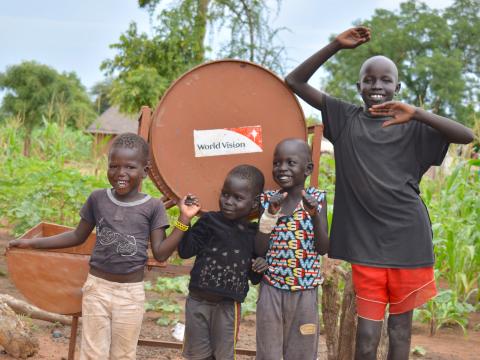Sanitation facilities in South Sudan’s IDP settlement keep children from diseases and threats of abductions

Yar, 10, used to walk for almost an hour through the bush that served as the community people’s toilet. “There were no pit latrines then and we relieved ourselves where it was convenient”, says Yar.
Her family is among the 26 households provided with hand-washing facility and pit latrines to avert the spread of waterborne diseases like diarrhea, break the chain of infection and help reduce infant mortality.
”I used to go with my children to make sure they are safe. Two children in the neighbourhood were abducted and got killed this year”, says Yar’s mother Nyandeng, 40.

Many families, including Yar’s, fled from Jonglei State to Juba town when severe flooding devastated towns. Her mother were left responsible of seven children.
“I used to farm in a piece of land that fed my family way back in our hometown. Now I depend on a small plot that we garden and the food assistance from World Vision”, Nyandeng says.
Simple as it may seem to people in developed countries, the pit latrine in their home changed their lives. “I no longer worry about snakes and being abducted”, Yar says.
The 2022 South Sudan Humanitarian Needs Overview identified “poor water, sanitation and hygiene (WASH) services”, as one of the key drivers of humanitarian needs in the country.
World Vision’s water, sanitation and hygiene program, supported by the South Sudan Humanitarian Fund (SSHF) and World Vision Taiwan, made the construction of the pit latrines possible.
The program also provided hand-washing facilities to the the internally-displaced persons (IDP) settlement in Mangalla, especially for the elderly, widows and women-led households.

“My children used to fall sick regularly but not anymore. Even my neighbors’ children who had constant diarrhea are healthy now. We are protected from germs and illnesses”, she adds.
Project Coordinator Iddi Hillary explains, “An estimated 2,000 people in the settlement, 1,040 of them women, use the sanitation facilities.”
“World Vision also fabricated and installed 35 handwashing facilities at the camp to promote hygiene and reduce the spread of diseases”, Hillary concludes.
The 2022 South Sudan Humanitarian Needs Overview identified “poor water, sanitation and hygiene (WASH) services”, as one of the key drivers of humanitarian needs in the country.

Story and photos by Jemima Tumalu, Communications Officer